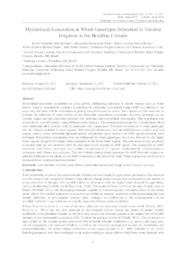Mycorrhizal association in wheat genotypes submitted to variable irrigation in the Brazilian Cerrado.
Mycorrhizal association in wheat genotypes submitted to variable irrigation in the Brazilian Cerrado.
Author(s): MENDEZ, D. F. S.; PAULA, A. M. de; RAMOS, M. L. G.; RIBEIRO JUNIOR, W. Q.; BUSATO, J. G.; SOARES, G. F.; LIMA, C. A.
Summary: Mycorrhizal association contributes to plant growth, influencing tolerance to abiotic stresses such as water deficit. There is considerable variation in infection by arbuscular mycorrhizal fungi (AMF) in cultivars of the same crop, but there is little information regarding these differences in wheat. The objective of this work was to evaluate the influence of water deficit on the arbuscular mycorrhizal association in wheat genotypes in the Cerrado region and the association between soil attributes and mycorrhizal colonization. The experiment was conducted in a no-till system, using different water regimes. The experimental design was a randomized block with subdivided plots scheme, with 12 treatments and 3 repetitions. The plots consisted of 4 wheat genotypes and the subplots included 3 water regimes. Mycorrhizal colonization, soil microbial biomass carbon, total soil organic carbon, easily extractable glomalin-related soil protein, spore number and AMF species diversity were evaluated. Mycorrhizal colonization was not influenced by wheat genotypes, but it was favored by the higher water regime, being 44.8% higher when compared to the lower water regime. The soil moisture was positively correlated with the soil attributes with the exception of the number of AMF spores. The community of AMF associated with wheat genotypes was similar, comprising of 12 species, predominantly Claroideoglomus etunicatum and Glomus macrocarpum. The low variation among wheat genotypes for AMF diversity suggests no selective influence of the plants on the AMF community in the area of the study. Water regime was shown to be a dominant factor in mycorrhizal association.
Publication year: 2021
Types of publication: Journal article
Unit: Embrapa Cerrados
Keywords: Cerrado, Micorriza Vesicular Arbuscular, Plantio Direto, Seca, Solo, Triticum Aestivum
Observation
Some of Embrapa's publications are published as ePub files. To read them, use or download one of the following free software options to your computer or mobile device. Android: Google Play Books; IOS: iBooks; Windows and Linux: Calibre.
Access other publications
Access the Agricultural Research Database (BDPA) to consult Embrapa's full library collection and records.
Visit Embrapa Bookstore to purchase books and other publications sold by Embrapa.

